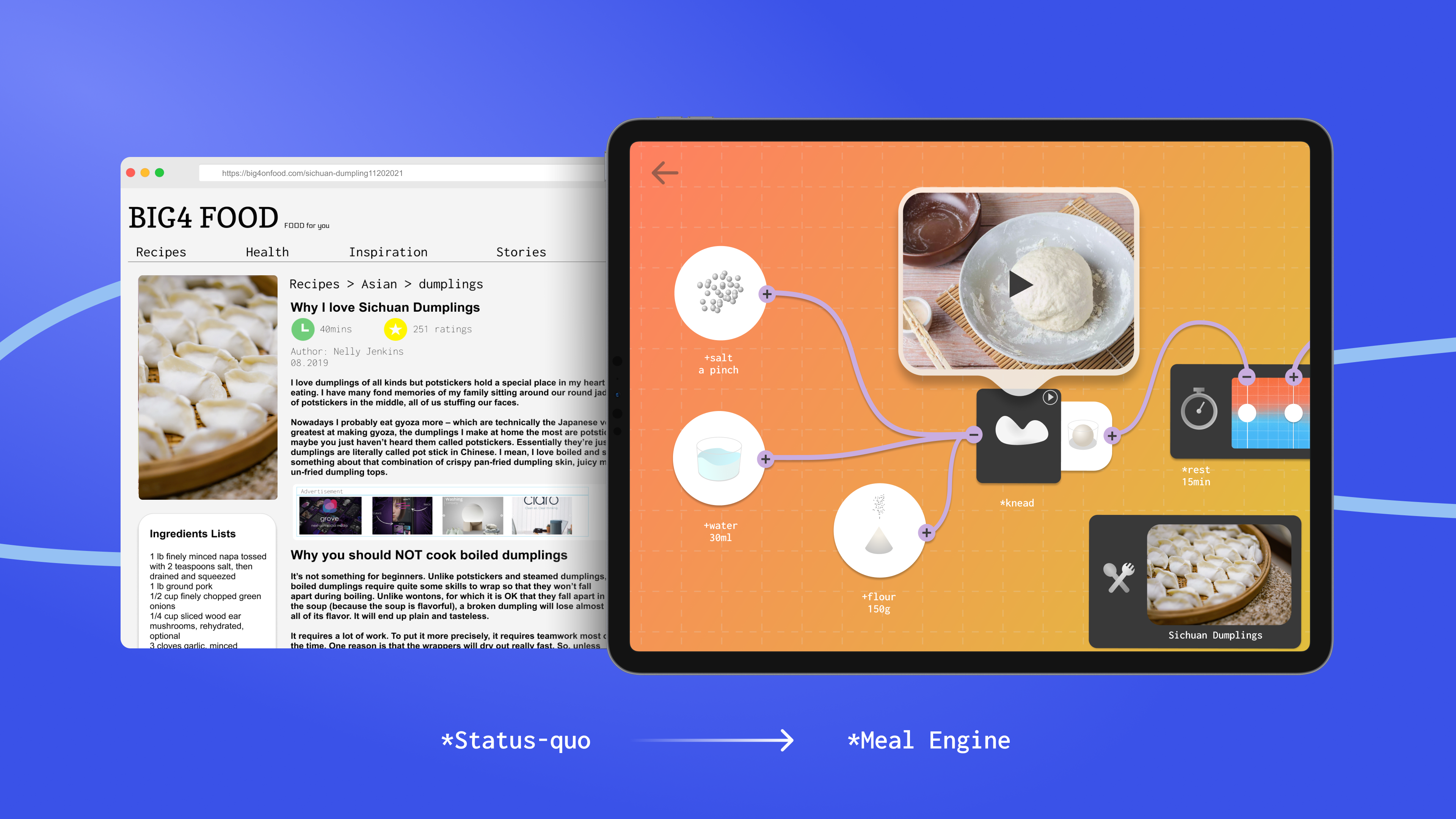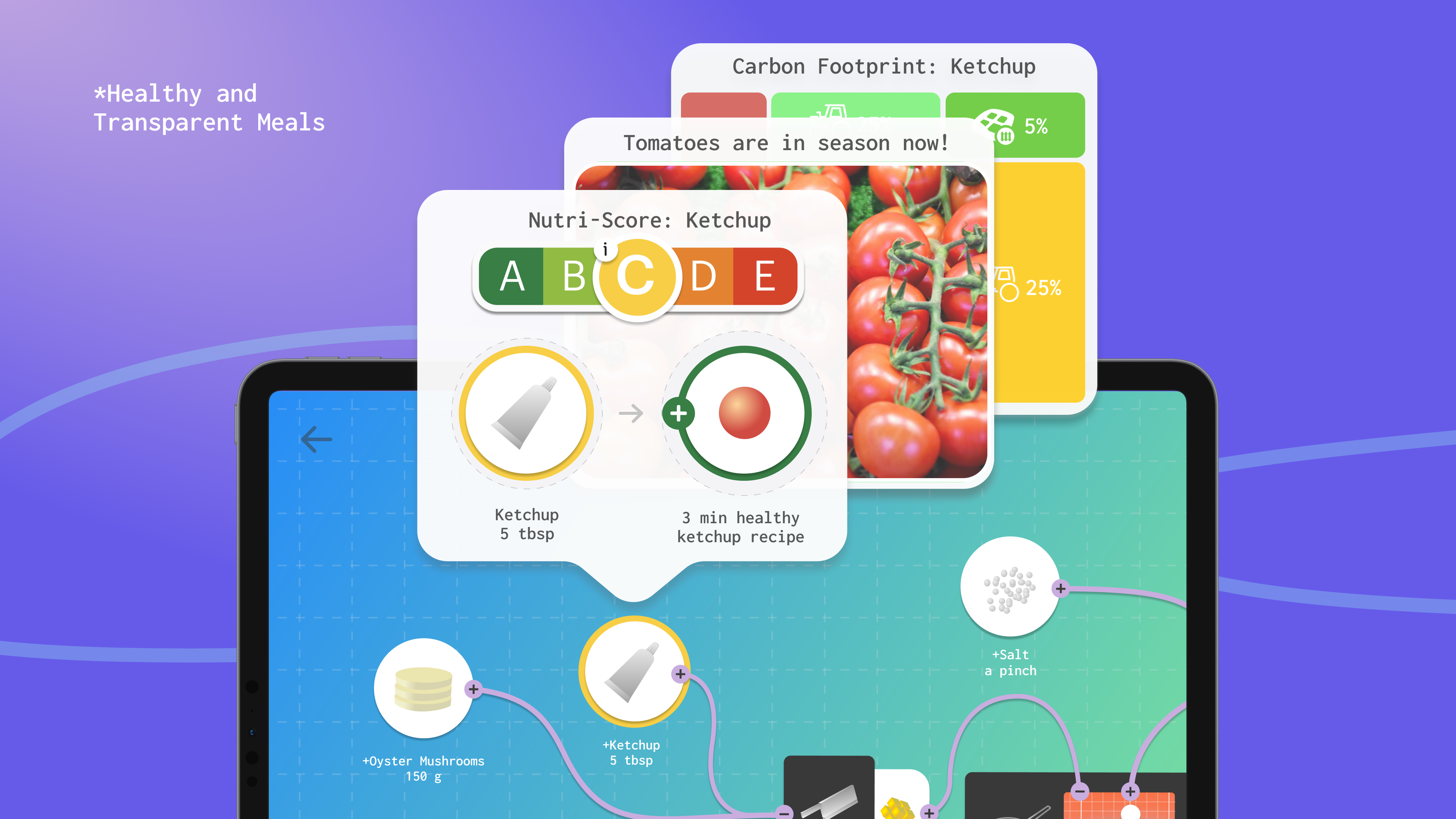Meal Engine
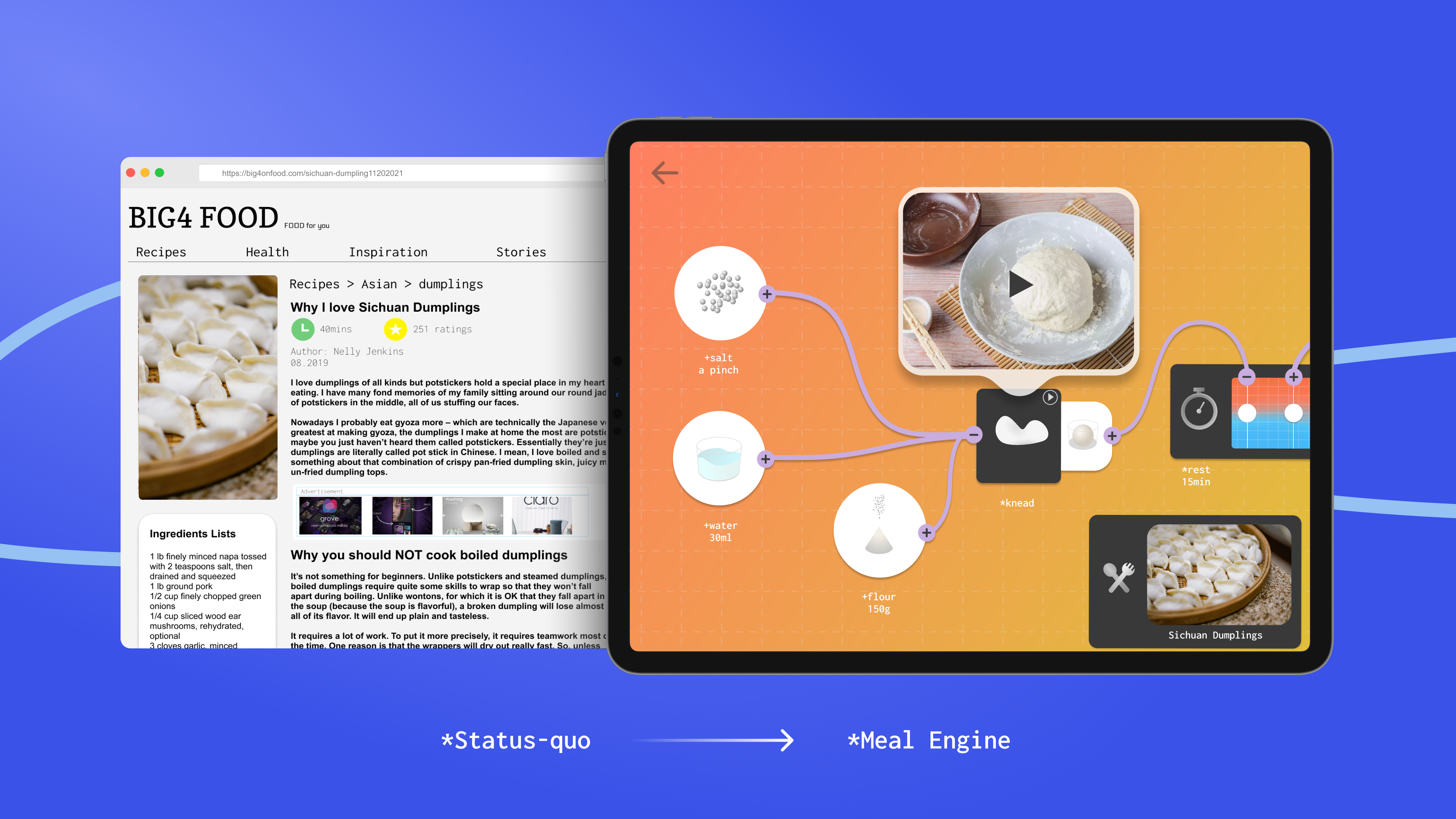
Useful information
- Team members
- Sandeep Hoonjan Ferdinand Kohle Jenny Hu Yifu Liu
- Country
- United Kingdom
- Keywords
- Cooking; Recipe; Health; Sustainable Food; Creativity; Future of Cooking; User Interaction Design;
Short Description
Meal Engine is a smart, online recipe editor for creating healthier, sustainable, and tasty meals.
Detailed Description
Food is at the centre of some of the biggest global challenges associated with climate change, public health, and ecological damage. However, during shopping, cooking, and eating, the complex information associated with food is overwhelming. Our team asks: how can we help navigate this complexity to make decisions actionable? Meal Engine is a web-based recipe editor that leverages big data systems to promote transparency and give home cooks the agency needed to take control over their culinary life. Recipes are presented as a graphical flow of ingredients and cooking steps embedded with information about seasonality, carbon footprint, nutritional values, or supporting media content. Due to its graphical layout, Meal Engine can easily adapt any recipe to its user’s individual needs. For example, With the press of a button your favourite meal can become seasonal, gluten-free, with local ingredients, and more.
Project Details
- Does your design take social and cultural challenges and human wellbeing into consideration?
Despite awareness that food choices are important for health, obesity is consistently one of the biggest health crises faced by the EU, we want to reduce obesity-related illnesses by rethinking our food system. Obesity reduces mental health, life expectancy and increases the chance of life-limiting diseases such as cancer, heart diseases, type 2 diabetes.
Preparing home-cooked meals is one of the simplest ways to improve physical and mental health. Studies showed that increased home cooking is associated with overall healthier dietary patterns. It was demonstrated that cooking skills correlate with lower intakes of convenience food, take-away food, and ultra-processed food.Yet, cooking can be bothersome. Before cooking can even begin, we often have to surf the web, read long web pages, sort dietary restrictions, plan meals and prepare groceries, making us hit the delivery button on popular apps like UberEats and Deliveroo or cooking the same meals over and over again.
ME was inspired by this problem and designed to centralise the entire process through one graphical interface, making recipes easier to read, generate grocery lists, personalise meals, and cook with instructions. ME is the cookbook of the 21st century. It rethinks the recipe as the focal point where information about food comes together, and where fun, curiosity, creativity, and confidence start. Unlike non-adaptive recipe articles or video tutorials, ME presents recipes as an interactive graphical flow made up of ingredients and cooking actions (nodes) that reveal cooking processes at a glance.
- Does your design support sustainable production, embodying circular or regenerative design practices?
The food choices we make are critical for the environment. The way food is farmed impacts water and air quality, soil, and biodiversity. It is essential that we reconsider our diets and our food systems.
Although the internet contains an enormous amount of information on food related health and sustainability, it is hard to navigate and collect relevant information. We need new tools that support us in our efforts for healthy and sustainable food consumption and that exploit the new opportunities that arise from increased digitalization.
Meal Engine (ME) is a platform that centralises relevant information and gives predictive and prescriptive feedback on health and food sustainability. ME enables people to reduce carbon consumption and wastage in their cooking process, by allowing them to adapt any recipe they desire to accessible, local, sustainable ingredients, while retaining the taste and feel of the original. ME suggests in-season ingredients replacement from local shops, to cut the nutrition loss in transportation while benefits small local business. Even for those who experience severe food scarcity, ME can give them a greater variety of recipes from fewer ingredients. In the preparation phase, ME enables creative incorporation of unconventional food in the fridge, for example, adding orange peels in stew to get a Vitamin-C boost.
- Does your design use principles of distribution and open source?
While food recipes are largely “open source” already, Meal Engine promotes a greater bandwidth of sharing and collaboration through a centralized platform. Compared to individual recipe articles or video tutorials, Meal Engine lets you alter, author, and immediately share your own versions of the recipe to the greater food enthusiast community. Our interface promotes a playful approach to cooking using adaptable, dynamic recipe generation.
Transparency of wider food systems is a key factor to adapting any given recipe. Meal Engine is uniquely positioned to incorporate grocery distribution data to recommend ingredients and transform meals based on local food availability and interests. Meal Engine can help create healthy and delicious meals with even limited access to varied and fresh ingredients.
With these tools, Meal Engine can positively influence food cultures to think about how food is made and where it comes from, making a more diverse range of recipes available to anyone regardless of ingredient availability.
- Does your design promote awareness of responsible design and consumption?
Food is at the centre of some of the biggest global challenges associated with climate change, public health, and ecological damage. Tackling obesity, obesity-related diseases, and food and drink consumption-based greenhouse gas emissions requires us to rethink our diets and incentivise change in our food systems. Preparing home-cooked meals is one of the simplest ways to improve physical and mental health and to take action towards the reduction of greenhouse gas emissions.
Meal Engine can accelerate a “farm to fork” strategy, by strategically recommending ingredients and substitutions to existing recipes that favour food with lower carbon footprint, and act to reduce food waste. With innovations such as the increase in traceability of food with incoming blockchain technology by other innovators, Meal Engine brings the benefits directly to consumers, to effortlessly decrease the environmental impact of their food choices.
At the same time, Meal Engine offers a unique graphical recipe interface that opens new possibilities for children to engage with recipes and cooking, forming a gateway to building healthy eating habits, self-confidence and organizational skills.
Meal Engine is the 21st century answer to living healthier and more sustainable through simple daily, delicious actions.
Images

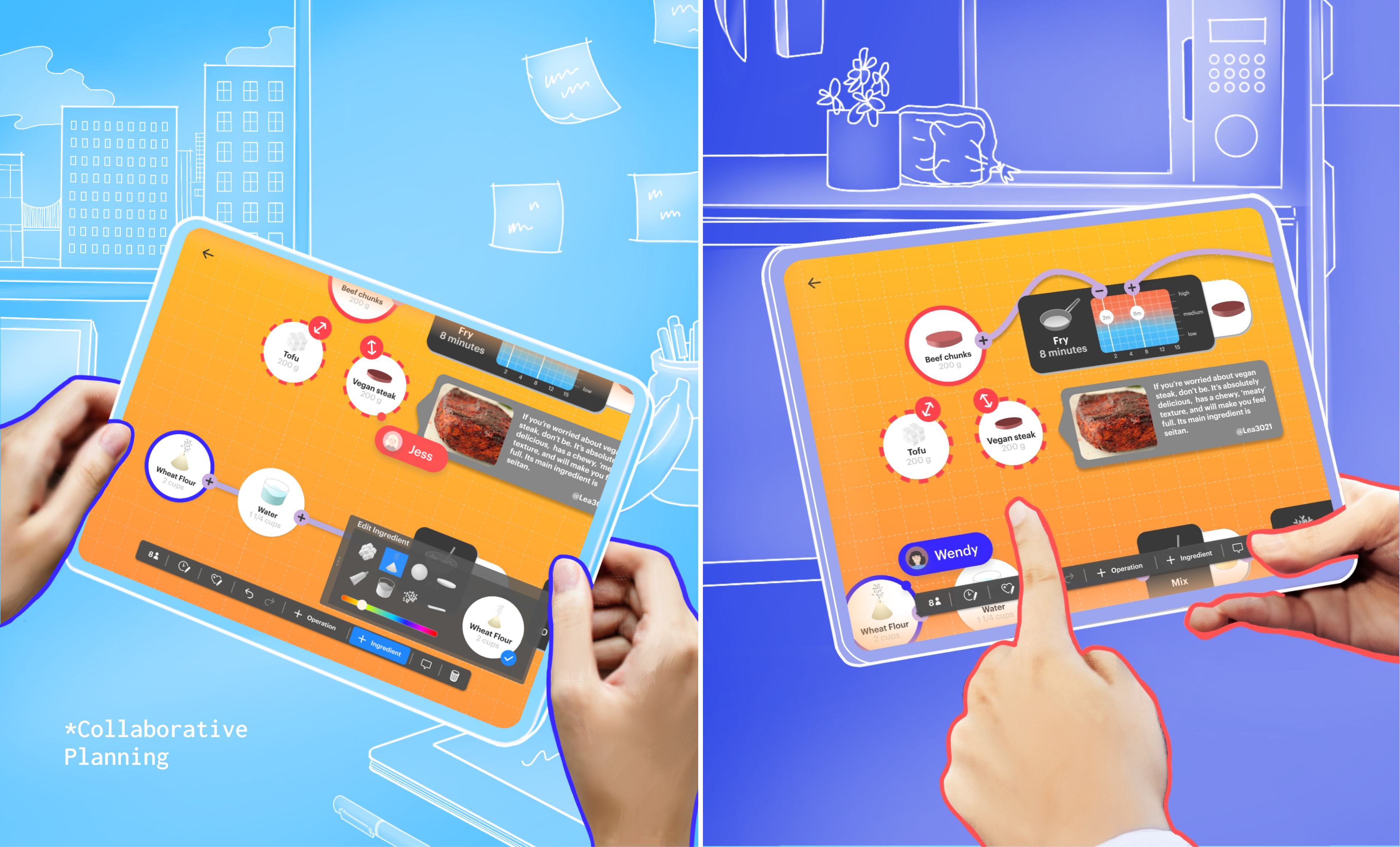
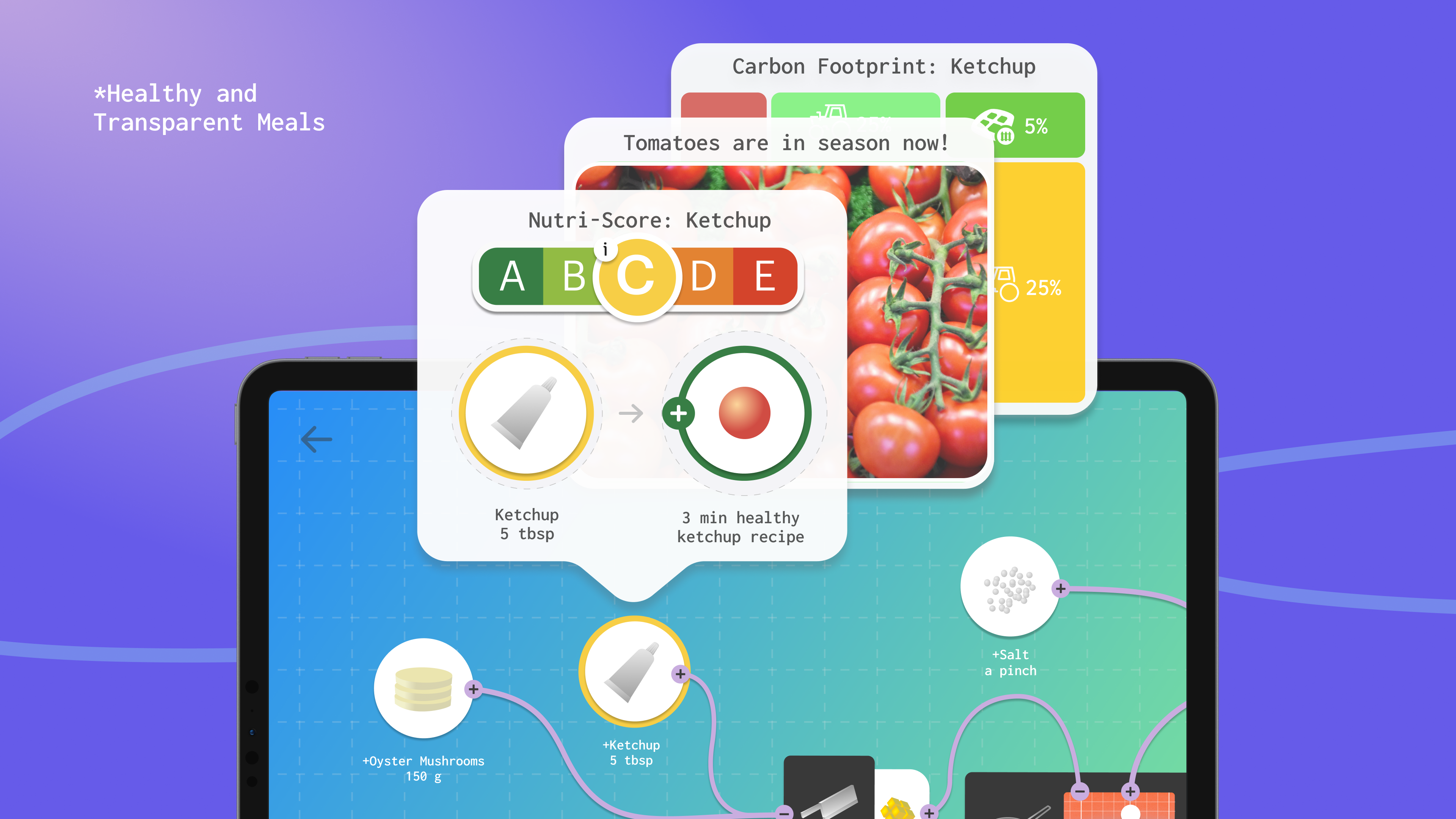
Video
Project Website
Social Media Accounts
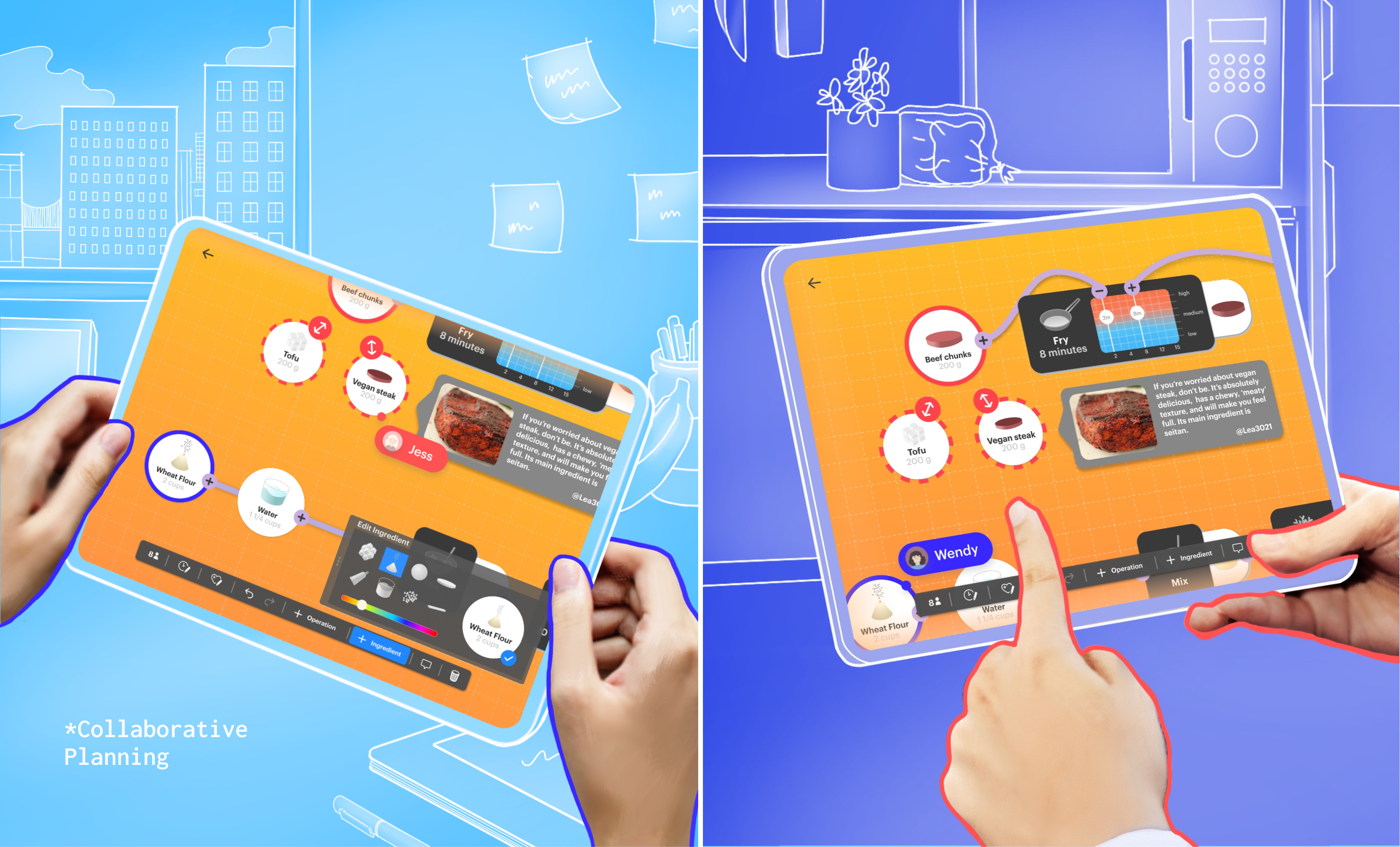
Useful information
- Team members
- Sandeep Hoonjan Ferdinand Kohle Jenny Hu Yifu Liu
- Country
- United Kingdom
- Keywords
- Cooking; Recipe; Health; Sustainable Food; Creativity; Future of Cooking; User Interaction Design;
Short Description
Meal Engine is a smart, online recipe editor for creating healthier, sustainable, and tasty meals.
Detailed Description
Food is at the centre of some of the biggest global challenges associated with climate change, public health, and ecological damage. However, during shopping, cooking, and eating, the complex information associated with food is overwhelming. Our team asks: how can we help navigate this complexity to make decisions actionable? Meal Engine is a web-based recipe editor that leverages big data systems to promote transparency and give home cooks the agency needed to take control over their culinary life. Recipes are presented as a graphical flow of ingredients and cooking steps embedded with information about seasonality, carbon footprint, nutritional values, or supporting media content. Due to its graphical layout, Meal Engine can easily adapt any recipe to its user’s individual needs. For example, With the press of a button your favourite meal can become seasonal, gluten-free, with local ingredients, and more.
Project Details
- Does your design take social and cultural challenges and human wellbeing into consideration?
Despite awareness that food choices are important for health, obesity is consistently one of the biggest health crises faced by the EU, we want to reduce obesity-related illnesses by rethinking our food system. Obesity reduces mental health, life expectancy and increases the chance of life-limiting diseases such as cancer, heart diseases, type 2 diabetes.
Preparing home-cooked meals is one of the simplest ways to improve physical and mental health. Studies showed that increased home cooking is associated with overall healthier dietary patterns. It was demonstrated that cooking skills correlate with lower intakes of convenience food, take-away food, and ultra-processed food.Yet, cooking can be bothersome. Before cooking can even begin, we often have to surf the web, read long web pages, sort dietary restrictions, plan meals and prepare groceries, making us hit the delivery button on popular apps like UberEats and Deliveroo or cooking the same meals over and over again.
ME was inspired by this problem and designed to centralise the entire process through one graphical interface, making recipes easier to read, generate grocery lists, personalise meals, and cook with instructions. ME is the cookbook of the 21st century. It rethinks the recipe as the focal point where information about food comes together, and where fun, curiosity, creativity, and confidence start. Unlike non-adaptive recipe articles or video tutorials, ME presents recipes as an interactive graphical flow made up of ingredients and cooking actions (nodes) that reveal cooking processes at a glance.
- Does your design support sustainable production, embodying circular or regenerative design practices?
The food choices we make are critical for the environment. The way food is farmed impacts water and air quality, soil, and biodiversity. It is essential that we reconsider our diets and our food systems.
Although the internet contains an enormous amount of information on food related health and sustainability, it is hard to navigate and collect relevant information. We need new tools that support us in our efforts for healthy and sustainable food consumption and that exploit the new opportunities that arise from increased digitalization.
Meal Engine (ME) is a platform that centralises relevant information and gives predictive and prescriptive feedback on health and food sustainability. ME enables people to reduce carbon consumption and wastage in their cooking process, by allowing them to adapt any recipe they desire to accessible, local, sustainable ingredients, while retaining the taste and feel of the original. ME suggests in-season ingredients replacement from local shops, to cut the nutrition loss in transportation while benefits small local business. Even for those who experience severe food scarcity, ME can give them a greater variety of recipes from fewer ingredients. In the preparation phase, ME enables creative incorporation of unconventional food in the fridge, for example, adding orange peels in stew to get a Vitamin-C boost.
- Does your design use principles of distribution and open source?
While food recipes are largely “open source” already, Meal Engine promotes a greater bandwidth of sharing and collaboration through a centralized platform. Compared to individual recipe articles or video tutorials, Meal Engine lets you alter, author, and immediately share your own versions of the recipe to the greater food enthusiast community. Our interface promotes a playful approach to cooking using adaptable, dynamic recipe generation.
Transparency of wider food systems is a key factor to adapting any given recipe. Meal Engine is uniquely positioned to incorporate grocery distribution data to recommend ingredients and transform meals based on local food availability and interests. Meal Engine can help create healthy and delicious meals with even limited access to varied and fresh ingredients.
With these tools, Meal Engine can positively influence food cultures to think about how food is made and where it comes from, making a more diverse range of recipes available to anyone regardless of ingredient availability.
- Does your design promote awareness of responsible design and consumption?
Food is at the centre of some of the biggest global challenges associated with climate change, public health, and ecological damage. Tackling obesity, obesity-related diseases, and food and drink consumption-based greenhouse gas emissions requires us to rethink our diets and incentivise change in our food systems. Preparing home-cooked meals is one of the simplest ways to improve physical and mental health and to take action towards the reduction of greenhouse gas emissions.
Meal Engine can accelerate a “farm to fork” strategy, by strategically recommending ingredients and substitutions to existing recipes that favour food with lower carbon footprint, and act to reduce food waste. With innovations such as the increase in traceability of food with incoming blockchain technology by other innovators, Meal Engine brings the benefits directly to consumers, to effortlessly decrease the environmental impact of their food choices.
At the same time, Meal Engine offers a unique graphical recipe interface that opens new possibilities for children to engage with recipes and cooking, forming a gateway to building healthy eating habits, self-confidence and organizational skills.
Meal Engine is the 21st century answer to living healthier and more sustainable through simple daily, delicious actions.
Images

